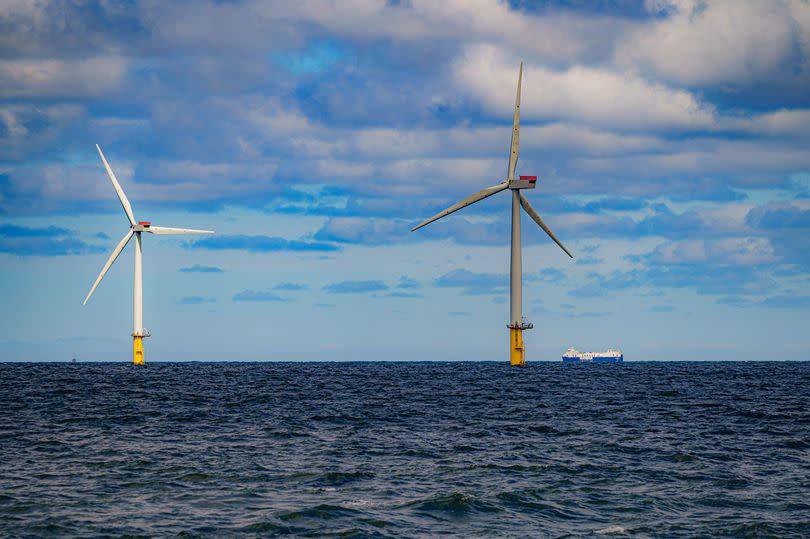UK could get £30bn renewable energy boost if next Government shows ‘bold leadership’ and ends planning logjam, offshore wind industry leaders say

The leaders of Britain’s offshore wind industry say the next Government needs to show “bold leadership” to help unlock a £30bn renewable energy boost for the UK.
RenewableUK’s chief executive Dan McGrail told the Global Offshore Wind 2024 conference that whoever wins the next election should make wind power” the core of the country’s energy system.
Meanwhile the Offshore Wind Industry Council used the conference to demand that the consent and planning process for offshore wind projects be sped up - and say the Cabinet Office and Number 10 Policy Unit would need to drive that mission across the whole of government.
Read more: Northern leaders urge next Government to commit to infrastructure plan
Learn more: Sign up to our BusinessLive newsletters here
The sector’s key players are gathering in Manchester this week for the Renewables UK annual conference and exhibition.
Speaking at its opening session on Tuesday, Mr McGrail said: “Never before has our conference taken place at a moment when the content of our conversations and the boldness of our leadership can have such a direct impact on the years ahead.
“After several years of turmoil, we should finally be entering an era where wind energy becomes the core of the energy system. There is no doubt our sector has had a bumpy couple of years. The jarring effect of inflation on supply chains around the world has disrupted market prices, risk profiles and attitudes to the sector unlike anything we have seen before in the industry’s development. Yet the market is turning the corner. According to our new EnergyPulse report, the sector added 21% to its global installed capacity in the last year alone.
“In the UK, we can look ahead to a positive auction for new offshore wind projects in 2024, with nearly 11 gigawatts of capacity eligible to bid in, including a healthy mix of established fixed-bottom projects as well as innovative floating wind projects.
“We have spent much of the last year developing our offshore wind Industrial Growth Plan. Economic growth has been put at the heart of this election and many others around the world. After the UK election, the Secretary of State will arrive at a very early decision about how much offshore wind to procure this year. With the right backing, nearly £30 billion of private investment into renewables, across all technologies, can be secured this autumn, with an industrial plan to stimulate the jobs and careers across Britain, kickstarting economic growth and industrial reinvention”.
The Offshore Wind Industry Council (OWIC)'s latest report, produced by Aeos and Deloitte, looks at the challenges of the consenting process for offshore wind projects in the UK.
It found that recent planning system reforms had only reduced the time it takes to consent an offshore wind farm “by a matter of months”, and that new legislation might not significantly reduce those times. Instead, it suggests a programme of initiatives would have to be co-ordinated and driven by the Cabinet Office and Number 10 Policy Unit to be successful, across government departments and devolved administrations.
The report, “Policy and Legislative Barriers to Consenting Offshore Wind”, recommends four key measures:
Developing and setting out an optimal long-term future energy mix for the UK.
Developing a spatial plan for National Grid to deliver a long-term energy mix aligning with estimates of future electricity generation.
Delivering well-resourced marine spatial planning to underpin and support seabed leasing.
Aligning the financial support mechanisms with the pipeline of future projects, to provide greater certainty to all parties in the process.
RenewableUK’s Kat Route-Stephens, who leads the Environment and Consents programme for OWIC, said: “Implementing the four key measures set out in this report is vital to speed up the delivery of the UK’s world-class pipeline of offshore wind projects. By cutting through longstanding barriers we can stay on track to decarbonise our electricity system and maintain our position as a global leader in offshore wind”.
RenewableUK’s executive director of policy Ana Musat said: “There is a strong cross-party consensus on the need to ramp up offshore wind development, so whoever wins the next election is going to have to focus on improving the planning system around it.
“That direction must come from the Cabinet Office and the Number 10 Policy Unit, bringing together all the relevant departments, stakeholders and devolved governments with industry. If we get the framework right early on, we can ensure there’s consistent co-ordination to deliver the projects we need to strengthen our energy security and provide cheap power for consumers”.

 Yahoo News
Yahoo News 
